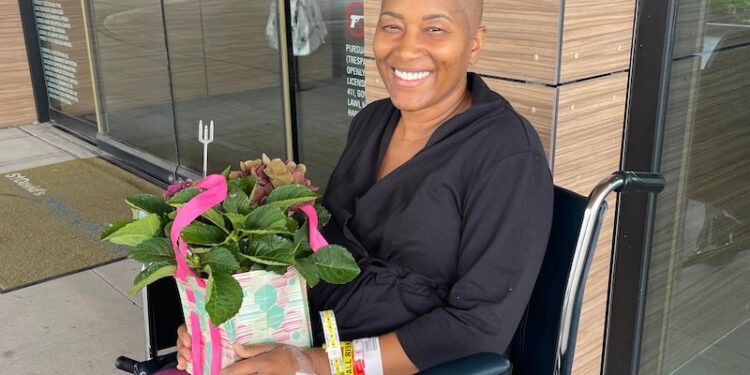Felicia Reed, 49, is making real dreams come true for several women living with a form of metastatic breast cancer. Her team helps her shape what she calls “legacy shoots” for the women she photographs. It started as a give-back project. Reed had quit her job as a breast imaging technician to launch this initiative. But it means even more now that she is a breast cancer survivor herself.
Table of Contents
Reed Was Impacted by Breast Cancer Early in Life
Reed says her dance with breast cancer began when she was just 18. “My mother, who had been diagnosed with an aggressive form of the disease, lost her battle when she was 40,” Reed says.
But the pain of that kind of loss revisited her family. When her younger sister was diagnosed with the same aggressive form of breast cancer. This was the first glamour shoot Reed did for a woman living with breast cancer. “It brought her such joy,” Reed says. Unfortunately, she passed away at age 38.
“Then, at age 33, my older sister was also diagnosed, but miraculously, she continues to fight her own battle,” the photographer adds.
Her Diagnosis, Her Own Story
“Our family history was a stark reminder of the importance of early detection and being vigilant,” Reed says. “I have always been proactive about my health, especially regarding breast cancer.”
Reed, who was a breast imaging tech doing mammograms before she became a successful photographer, says, “I started getting mammograms at 30 and kept up with them religiously for nearly 15 years. It went from routine to reality in November of 2021. “I received an unexpected callback for additional images and, of course, anxiety set in,” Reed says. Soon, she faced the daunting prospect of a biopsy.
“The irony was that I had spent over 15 years working in breast imaging and was now on the other side of the exam table,” Reed adds.
Black Women and Breast Cancer By the Numbers
As the rates of breast cancer overall are going down, rates of aggressive and invasive breast cancer in Black and Brown women continue to rise, according to the Breast Cancer Research Foundation (BCRF). According to BCRF, in 2025, more than 319,750 new cases of invasive breast cancer and 59,080 new cases of ductal carcinoma in situ (also known as stage 0 breast cancer) will be diagnosed in women in the United States. While there has been an overall 44 percent decline in breast cancer deaths since 1989—thanks to gains in awareness, earlier diagnoses, and more effective treatments—there is a persistent mortality gap between Black women and white women.
Reed’s Diagnosis and Treatment

“My diagnosis was invasive ductal carcinoma, Stage 1, Triple Positive – considered one of the more manageable forms of breast cancer,” Reed says. “I was given the option of 12 weeks of chemotherapy, and if I chose a mastectomy, I could avoid radiation.” The photographer chose that form of treatment and has had five surgeries to date.
“While I couldn’t control my diagnosis, I could control my attitude and approach to this challenging journey.”
The mom, wife, and sister says, that her strong faith helped her navigate the treatment that got her through to the other side. She says the support of her husband and two teen sons was invaluable. “I held a steadfast belief that I was healthy, before each test, and that I would remain healthy. My body was, and still is, a remarkable healing machine,” she adds.
Making Breast Cancer Patients Feel Beautiful is Even More Important to Her Now

Reed has also remained focused on bringing beauty and joy to other women living with breast cancer through her photography, even while she was still in treatment.
She never forgot the joy that the experience of being a cover girl gave her sister. The aspiring creative partnered with the local Breast Cancer Resource Center of Central Texas to conduct the photo shoots. “I have the nonprofit choose the women who will participate, and I bring together a team that pampers them and creates legacy photos for them and their family.” I am honored to be a part of their journey.

Even though Reed acknowledges that her journey hasn’t been easy, she says, My breast cancer journey has also been marked by resilience, hope, and a strong mindset.
“I hope my story inspires other women facing similar battles to stay positive, proactive, and determined,” she says.
“Then, at age 33, my older sister was also diagnosed, but miraculously, she continues to fight her own battle,” Reed concludes.
Resources
























